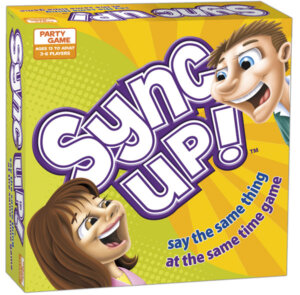
Publisher: USAopoly
Designers: Garrett J. Donner, Brian S. Spence, and Michael S. Steer
Year: 2009
Players: Three to six players
Ages: 13+
Playing Time: 30 Minutes
Genre: Betting and bluffing party game
MSRP: $19.95
To me Sync up seems like one of those couples games. Don’t get me wrong, it will work well with any group, but I think it hits the sweet spot when played with couples. Sync Up involves saying the same answer at the same time with your partner.
The game plays with 3-6 players, and comes with a dry erase chart and marker that shows the different play setups with different numbers of players. Each chart allows you to write down the player’s names, tells you how many rounds the game will last, and tells you who your partner is for each round.
There are set of betting cards for each player with values from zero to four. Each time you play in a round you and your partner will guess how many answers on the card that you will be able to sync up on. If you are correct, you get to move one extra space on the board.
Speaking of the board, it is a small square affair with spaces leading into the center. The player’s pawns proceed along the track moving two spaces for each “Synched Up” answer and the first one to reach the center wins.
The meat of the game takes place using the included stack of category cards. Each card is double sided and lists a general category at the top, then four separate questions underneath.
Each round is tracked on the turn board. The board indicates who the partners are for the current round, and someone else is the reader. The reader selects a card and tells the partners the category. The partners each secretly select the card indicating the number of times they think that they will sync up on the current card.
Next the reader reads the top question and says “Ready, Set, Sync Up!”
The two partners for the turn have to blurt out their answers at the same time. If they say the same answer, they get credit for getting one right. The reader does the same with the other three questions on the card.
The questions range from really difficult to pretty easy.
For example: Category – U.S. Cities
Q1: A City with a two-word name
Q2: A Dangerous City altogether
Q3: A Vacation City
Q4: A city with a population over one million
That might be a pretty hard card to sync up on.
Example 2: Category – Fill in the Blank
Q1: Fast and ___
Q2: Young and ___
Q3: Clean and ___
Q4: Wet and ___
This one seems a little easier to come up with matching answers.
Afterwards, each partner gets to move two spaces on the board for each matching answer, and one extra space for selecting the correct number of synced answers with their hidden cards.
Play proceeds to the next player and their partner indicated on the turn tracker.
You play through each round, and the first person who reaches the center space on the board wins the game.
Each game, if you have a turn with no matching answers, you can call for a do-over and get a new card. Each player only gets one do over per game, and you mark when it is used on the turn tracker board.
There is one additional twist to the game. If you land on a “close your eyes” space on the board, you have to keep your eyes closed as you blurt out your answers until you move off of the space.
The biggest difficulty is syncing up those answers. If you delay too long, and the other player blurts out their answer first, you can’t get a point. You really only get a second or two to think up an answer, so if you aren’t a quick thinker this will prove to be a difficult game indeed. In fact, the kids didn’t like it at all. Too much pressure for them.
If you’ve got the right mix of people together, like 2 or 3 couples, then this game can be a lot of fun. It is fairly short, and you get to argue and harass each other a lot like they used to do on Match Game PM. (“Who says Wet and WILD? It is Wet and DRY! What the heck were YOU thinking of?”)
Overall it is an ok party game. Most party games handle up to at least 8 players or allows for teams, and this one is three to six only, but it is pretty inexpensive and has a lot of replayability since there are over 200 double sided question cards. The game is pretty quick, so you’ll only go through around 20 cards in a game.
[rwp-review id=”0″]
- A Dungeon Delve for Kids?: A Review of Dungeon! - Oct 24, 2022
- Better, Stronger, Faster | Descent: Journeys in the Dark Second Edition Reviewed - Oct 23, 2022
- Your Planet is Doomed!: Invasion from Outer Space Reviewed - Oct 22, 2022